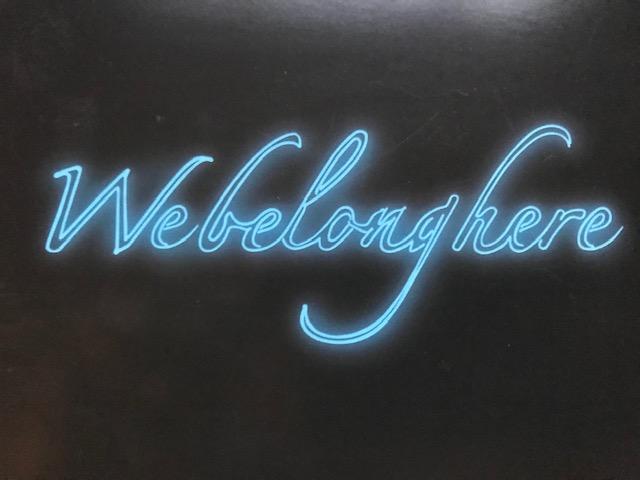In May, my husband and I went to Austin, Texas. While he was speaking at an immigration conference, I spent the afternoon at the Blanton Museum of Art. As I often do, I picked up a postcard of the art that really made an impact on me. One piece was “We Belong Here,” a blocked out blue neon and glass piece that hung against a black wall. It was part of a series by artist Tavares Strachan that included “I Belong Here,” and “You Belong Here.” The artist statement said, “As humans, we all struggle with how we fit in and belong. . . . Who gets to determine who belongs where? And where is here? And why does it matter?” Any change to the location or context of this work changes who “you” might be and where “here” is, bringing new nuances to the phrase. The welcoming tone struck by this phrase insinuates that perhaps many of us haven’t always felt included. I wanted to make a work that everyone can own—one that everyone can have. . . . Because as soon as you read it, you say, ‘I belong here,’ and you do belong.”
I’ve kept this postcard near my dining room table since May because it keeps speaking to me. In a time when we hear such inflammatory rhetoric that tells people of color to “go back where they came from” (regardless of whether that actually is a different country), when immigrants who are fleeing poverty and violence are separated from their family members and held in detention centers, when many are denied rights because of their gender identity, we are called to address the questions of belonging: who gets to determine who belongs where? And where is here? And why does it matter?
As people of faith we believe that our worth, our belonging-ness, comes from the one in whose image we were created. We belong here, not because of anything we have done, but because God declares it to be. All throughout our scriptures we hear stories of God working through displaced people, calling the displaced into a place of relationship with God, land, and each other. We hear throughout our scriptures that God keeps crossing our human-made borders of who is in and who is out, breaking down the boxes we create to bring all people together. “We All Belong” has become a spiritual refrain for me these past months, reminding me that we all belong to God because we are all loved by the creator and we are called to embody this refrain. This refrain keeps my attention focused on the ways we can help our neighbors in need, be a welcoming presence in the world and on our streets, and be a relationship builder when hate threatens to break us up.
What if our response to divisive speech is simply this refrain: We All Belong. What if our response to those who seek to marginalize others is: We All Belong. What if our response to oppression is: We All Belong. Live with this refrain while you read the news, while you pray, and while you go about your daily work and see how God is calling you into relationship with those you meet.
Peace to you, Pastor Ruth

